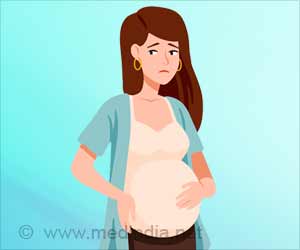Novel autoantibody called neo-self antibody is a major risk factor in Recurring Pregnancy Loss. Determining the cause could solve Japan's low birthrate and aging population issues.

‘Neo-self antibody is a major risk factor in recurring pregnancy loss (RPL). Potential solution for Japan's low birth rate and aging population issues.’
Read More..




It is expected that these results will contribute towards the illumination of the underlying mechanisms behind recurrent pregnancy loss, thrombosis and pregnancy complications such as hypertensive disorders; leading to the development of new treatment methods.Read More..
The findings were published online in the American College of Rheumatology's journal 'Arthritis and Rheumatology'.
Main Points
- Those with recurrent pregnancy loss (RPL) experience repeated miscarriages and stillbirths, making them unable to give birth to a healthy baby.
- In Japan, approximately 1,400,000 women are believed to suffer from RPL. In more than half of cases the cause cannot be determined, making it difficult to prescribe a treatment method. This is a big problem, especially in light of Japan's low birthrate and aging population.
- This study was based at Kobe University, which is putting a lot of effort into RPL research, and covered 227 patients in five university hospitals across the country. Approximately a quarter of these patients tested positive for the novel autoantibody (neo-self antibody).Furthermore, almost one fifth tested positive for the neo-self antibody among patients for whom common tests had been unable to determine the cause.
- It is expected that these results can illuminate the underlying mechanisms behind RPL, thrombosis and hypertensive disorders of pregnancy, leading to the development of new treatment methods.Furthermore, it is hoped that these research results can be the key to solving the low birthrate and aging population issues.
Research Background
Recurrent pregnancy loss (RPL) is a disorder in which the sufferer is able to get pregnant yet experiences repeated miscarriages and stillbirths, making them unable to give birth to a healthy baby. There is believed to be an estimated 1,400,000 women with RPL in Japan. Given Japan's low birthrate and aging population, this is an important issue to overcome. However, at present the cause remains unknown in over half of patients, making it difficult to know how to cure RPL in many cases.
Advertisement
This syndrome can lead to the occurrence of thrombosis (in which blood clots can block up blood vessels in vital organs, endangering life such as by causing a stroke), miscarriages, and hypertensive disorders of pregnancy, which can endanger the lives of pregnant women. These findings were published as a thesis in the American Society of Hematology's journal 'Blood' in 2015.
Advertisement
With this in mind, blood samples were collected from RPL patients across five university hospitals (Kobe University, University of Toyama, Okayama University, The University of Tokyo, and Hyogo Medical University), and the samples were tested for neo-self antibodies at RIMD. For the first time in the world, the research group conducted this clinical study to illuminate the association between RPL and the neo-self antibody.
Research Findings
This study was led by Kobe University, which is putting a lot of effort into RPL research, and involved testing for neo-self antibodies with the consent of outpatient couples affected by RPL at five university hospitals nationwide.
At the same time, a detailed examination into the cause of RPL in each case was carried out. This included testing for thyroid disorders, a chromosome analysis of each couple, and blood tests to investigate conditions that make blood clots form easily, such as the presence of antiphospholipid antibodies. Also, tests were carried out on the couples for genetic complexes that are associated with susceptibility to various diseases, such as Human Leukocyte Antigen (HLA) Class II. (For example, it is known that those with HLA-DR4 are prone to RPL).
The neo-self antibody testing method used in the study is a patented technology developed by this research group. This method involves producing cells where the complexes produced by£]2-glycoprotein I (a protein that is believed to be targeted by the antibody that causes antiphospholipid syndrome) and HLA Class II (the HLA type that increases susceptibility to antiphospholipid syndrome) are present on the cell surface. A reaction is then conducted between the complexes and the patient's blood to detect antibodies (neo-self antibodies), which bind to the complexes on the cell surface.
First of all, 208 women who did not have RPL and had previously given birth to healthy babies were tested for neo-self antibodies to establish normal levels. Subsequently, it was found that 52 (23%) out of 227 patients with RPL tested positive for the neo-self antibody.
The results of the tests carried out to determine the causes of RPL were evaluated. The neo-self antibody was the factor with the highest frequency compared to all other factors that were tested, including uterine issues (such as malformation and myomas), thyroid dysfunction, and chromosomal abnormalities in each partner.
This indicts the possibility that this neo-self antibody is a major cause of RPL. Even after testing for common RPL causes, the cause could not be determined in around half of the patients (121 women).
However, 24 (20%) of the 121 women with unexplained RPL were found to test positive for only the neo-self antibody. In particular, many who tested negative for antiphospholipid antibody criteria tested positive for the neo-self antibody.
When neo-self antibody positive women with RPL were compared with those RPL patients who tested negative, it was found that the frequency of those who had the HLA-DR4 gene, which predisposes the patient to RPL, was higher in neo-self antibody positive women than in negative women. Currently, it is unclear as to why those with HLA-DR4 are prone to RPL. It is hoped that this study's discoveries can serve as a key to understanding the reason.
By investigating the neo-self antibody, the researchers were able to illuminate the onset mechanism of RPL, in particular the onset mechanism of the disorder in some unexplained cases. This could lead to a solution for Japan's low birthrate and aging population issues.
Further Developments
This study has shown that the novel autoantibody (neo-self antibody) that was discovered by Associate Professor Tanimura and Professor Arase et al. is a major cause of RPL.
Next, the researchers aim to generate a drug which inhibits neo-self antibodies or suppresses their production. In addition, it is hoped that research into neo-self antibodies will illuminate the onset mechanism for obstetrics patients with conditions, such as unexplained hypertensive disorders of pregnancy and fetal growth restriction, where the cause is unknown.This could lead to the development of treatment methods for these patients.
Furthermore, it is possible that there is a neo-self antibody that triggers many common autoimmune disorders, such as rheumatism. Such a discovery could be revolutionary for both rheumatology and immunology.
Source-Eurekalert















